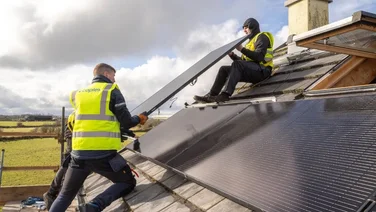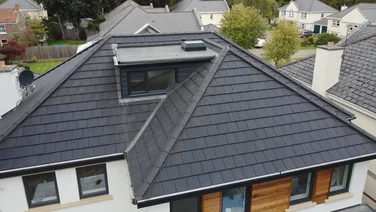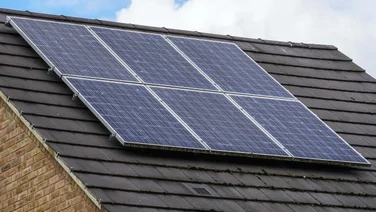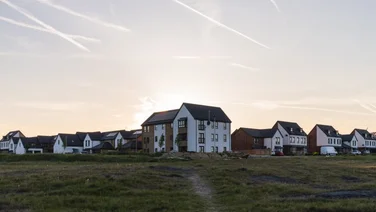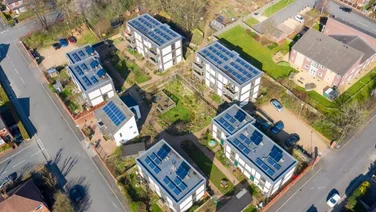- Solar panels will increase your home’s value by 2%, on average
- Going solar will typically save you £454 per year
- You could cut your footprint by 0.7 tonnes of CO2 per year with solar panels
Society is turning to renewable energy, and not a second too late. It’s crucial that we go as green as possible, in order to fight climate change – and as solar panel costs have fallen dramatically in recent years, this is the perfect moment to do so.
This is particularly true since the general election in July 2024, as the Labour government is investing heavily in renewable technologies to make it easier for people to install them.
Solar panels can save you a pretty packet, and are more efficient and more popular than ever. All of this translates into higher annual savings and lower emissions levels, and they’ll substantially increase your home’s value too, typically.
To receive tailored quotes for installing solar panels on your home, just fill in this quick form.
Where do you want to install solar panels?
Get started
Cost
Historically, the cost of solar panels has been the main barrier for most people wanting to get a set for their property. Thankfully, solar panels are cheaper than they’ve ever been, with an average cost that’s fallen by 70% since 2010 – which is good news for the planet.
Advances in technology also mean solar arrays are gloriously low maintenance, so once they’re up, you can let the panels do their thing without giving them a second thought.
That means you probably won’t have to pay for any repairs for decades.
They are an investment, costing £7,026 on average according to the latest MCS data – but even if you sell before you’ve made that back in savings, you’ll probably still make money.
A 2021 study by Solar Energy UK showed solar panels raise a home’s value by 2%, on average – which would increase the typical UK home’s value by £9,500.
Plus 69% of people are likely or very likely to buy or rent a property with solar panels, according to our latest National Home Energy Survey.
That seems like a win-win to us.
Want to learn more about the price of solar panels? Head to our helpful guide on Solar Panel Costs.
Savings
Electricity is very expensive right now, but is slowly declining, now priced at 22.38p per kilowatt hour (kWh).
The government’s Energy Price Guarantee has at least limited the rate at which this price is rising.
Still, this makes solar power all the more appealing. Based on the current cost of electricity, you’ll save an impressive £454 per year.
That’s money in your pocket that’s not being paid to the grid.
Reducing your electricity bill is more important than ever, and the more you can rely on solar power, the more you’ll save.
Thankfully, the Smart Export Guarantee (SEG) makes it easier to lean on solar energy at the moment. The SEG scheme compels large UK energy suppliers to pay you for renewable energy you send to the National Grid.
Where do you want to install solar panels?
Get startedCarbon emissions
A typical solar array could now allow you to cut your carbon emissions by as much as 1.6 tonnes of CO2 per year, according to the EST.
Every person in the UK is responsible for 6.5 tonnes of CO2e* per year, on average, according to the latest government statistics.
So reducing yours by 1.6 tonnes would cut your carbon footprint by 25%.
And you wouldn’t be alone in turning to renewable energy.
In the first quarter of 2020, the UK generated more electricity from renewable sources than fossil fuels for the first time – and the gap was huge.
Green energy took a 47% share – one-third more than fossil fuels, which produced 35.4%.
The tide isn’t just turning, it’s turned – and you could play a part in making the world a better place for current and future generations.
*carbon dioxide equivalent, a measurement that converts all greenhouse emissions into CO2 terms
Energy independence
This was one of the big talking points in the recent general election, the idea that the UK should be generating its own energy so as to not be vulnerable to geo-political crises, such as the Russia-Ukraine war.
It also trickles down to local level, and the government is trying to encourage communities to generate their own energy through wind and solar farms.
Solar energy will unquestionably play a big part in this effort.
Is it possible to become completely self-sufficient with just solar power? Thankfully, the answer is a resounding yes.
Solar panels have come on leaps and bounds in the past decade, and are now more effective than ever before.
The average solar array will now convert around 18 to 22% of sunlight it absorbs into electricity – up from 12% a mere 10 years ago, according to BBC News.
If you get your own panels, you can convert all that sparkling sunshine into pure energy that will directly power your household — and if you generate any extra power, you can use solar batteries to store it for another time.
What other electricity source has improved its efficiency by as much as 67% since 2010?
And even if you’re not able to install enough panels to become fully divorced from the Grid, it’ll certainly help to have a portion of independence – just in case.
Summary
- Now is a great time to buy solar panels, particularly with the investment from the new government.
- Solar panels are cheaper than ever, more effective, and ready to save you hundreds of pounds every year – as well as more than a tonne of CO2.
- Is now a good time to get solar panels? There’s never been a better time.
- If you’re ready to make the leap and ensure you can look back on one bright spot from this time, just fill in this form to receive quotes from solar specialists.


